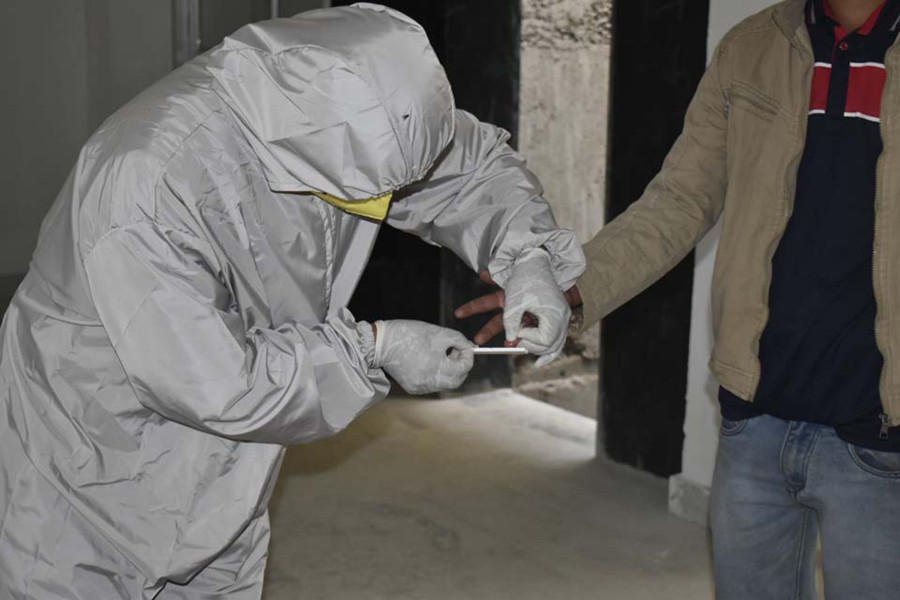Health
Rapid test kits procured by Omni only accurate 50 percent of the time, says report
A report by the Nepal Health Research Council on the poor validity of the test kits was submitted to the Health Ministry in May but rapid tests have continued regardless.
Arjun Poudel
The 75,000 rapid diagnostic kits procured by the government through Omni Business Corporate International are only able to detect the presence of the coronavirus antibodies 50 percent of the time, according to a report by the Nepal Health Research Council.
“Compared to the reference standard (RT-PCR), the sensitivities of the Wondfo Kits were 50 percent, and the specificities were 99.5 percent,” said the report, submitted to the Health Ministry in May but only released to the public in mid-June.
Sensitivity is the ability of a test to accurately detect those with the disease or antibody in question while specificity is its ability to accurately identify those without the disease or antibody. In this case, the Wondfo kits were able to correctly identify negative cases 99.5 percent of the time but only able to identify positive cases 50 percent of the time, when compared against the more accurate real-time polymerase chain reaction (PCR) tests.
The report is based on tests performed by the council in April on 200 individuals from Sudurpaschim Province, which has a high concentration of Covid-19 cases. Although the report had been submitted to the Health Ministry in May, laboratory officials say that the ministry held the report for a-month-and-a-half while continuing to employ RDTs for diagnostic purposes.
Rapid SARS-CoV-2 antibody test kits developed by Guangzhou Wondfo Biotech were procured by the Health Ministry via Omni Business Corporate International in late March for around $10 million. The procurement process had landed in controversy when questions were raised over the quality of the medical equipment and allegations of corruption. The Health Ministry had cancelled the procurement tender but since 75,000 RDTs had already arrived, decided to make use of them regardless.
The ministry had said that it will only use the test kits if they prove reliable, and had tasked the Nepal Health Research Council with carrying out the validity test. However, the ministry rolled out those test kits throughout the country at once without waiting for the report.
In early April, the National Public Health Ministry submitted a preliminary report based on just four samples from patients with Covid-19. Even in those four positive samples, one had shown a false result. The ministry, however, had pushed through with RDTs as a diagnostic tool.
This means that thousands of people have been sent home from quarantine after only being tasted with RDTs and 50 percent of them could’ve had false results, said the official.
According to Dr Harischandra Uprety, former director of the National Public Health Laboratory, the chances of the coronavirus spreading in the community will only increase if Nepal continues to rely solely on substandard RDTs.
“Use of rapid diagnostic tests in case detection was a serious blunder,” Upreti told the Post. “I still don’t understand what message the Health Ministry wants to convey by continuing to use test kits that give false and misleading results.”
According to the Nepal Health Research Council report, the Indian Council of Medical Research had returned Wondfo test kits after they showed variation in sensitivity in various Indian states. Health officials from Britain had also said that the Wondfo rapid diagnostic test kits were effective or accurate.
Wondfo itself had reportedly told the Chinese newspaper Global Times, that their “product was intended only as a supplement for patients who had already tested positive for the virus,” according to the New York Times.
The World Health Organization currently does not recommend the use of rapid diagnostic tests for patient care.
According to the Health Ministry, 233,546 rapid tests have been conducted across the country so far. These tests now include kits procured from other companies, not just Wondfo. But these are even more problematic, said a Health Ministry official.
"We cannot say it publicly, but the rapid diagnostic test kits being used throughout the country now are even more substandard than the ones Omni bought,” an official at the Health Ministry told the Post.
Thousands of people have been released from quarantine on the basis of rapid diagnostic tests and many have later tested positive on polymerase chain reaction tests. Some people have even died on the way home.
The health research council, in its report, recommends that the government stringently evaluate the validity of the rapid test kits they are using for mass screening.
"Accurate diagnosis of people infected with the SARS-CoV-2 is essential to control the global spread of COVID-19," the report stated. "The existing clinical accuracy of rapid tests still needs to be stringently evaluated before they are authorized for the mass screening of COVID-19."




 15.12°C Kathmandu
15.12°C Kathmandu














